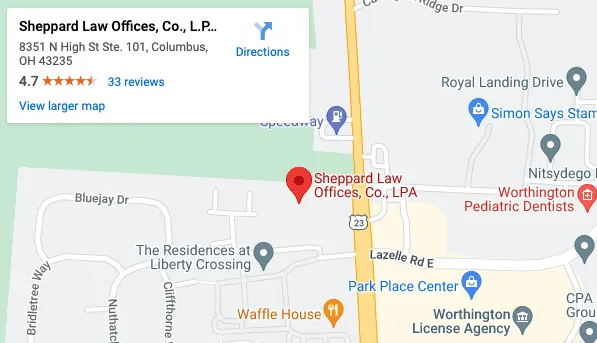
Protect Your Rights and Future with a Co-habitation Agreement Attorney by Your Side!
If you find yourself navigating the complexities of co-habitation agreements, our co-habitation agreement attorney in Columbus, OH, is here to guide you through the process with knowledge and care.
With our extensive experience in family law, we possess the knowledge and dedication necessary to address any issues that may arise. Whether you’re embarking on a new co-habitation arrangement or seeking clarity within an existing one, our team of family attorneys provides comprehensive guidance and proficient counsel.
Contact us today to schedule a consultation and show us how our firm can provide the legal support you need for a secure co-habitation agreement.
What is a Co-habitation Agreement?
A co-habitation agreement, also known as a domestic partnership agreement or a living together agreement, is a legally binding contract entered into by individuals who are living together in a committed relationship without being married. It establishes the rights, responsibilities, and expectations of the co-habiting parties and governs various aspects of their shared life, including financial matters, property ownership, living arrangements, and potential issues that may arise in the event of a separation or the termination of the co-habitation arrangement.
A co-habitation agreement is designed to provide clarity, protect individual rights, and address potential conflicts or disputes that may arise during the course of the relationship or if it comes to an end. It allows the parties involved to customize their agreement based on their specific needs and preferences, ensuring that their interests are safeguarded.
The agreement typically covers important aspects such as the division of proper support financial contributions, debt management, the allocation of household responsibilities, and even matters related to children, if applicable. By documenting these arrangements in a formal legal contract, co-habiting couples can establish a clear framework for their relationship and potentially avoid future conflicts or uncertainties.
It’s important to note that the specific legal requirements and enforceability of co-habitation agreements may vary depending on the jurisdiction and local laws. Seeking the guidance of a knowledgeable family law attorney is advisable to ensure that the deal meets the necessary legal standards and effectively protects the rights and interests of both parties involved.
SPOUSAL SUPPORT (ALIMONY)
What is a Co-habitation Agreement?
A co-habitation agreement, also known as a domestic partnership agreement or a living together agreement, can offer several benefits for couples living together but not married.
Here are some key advantages:
- Clarifying Financial Matters: A cohabitation agreement allows teams to outline how they will handle financial matters during their relationship. It can address issues such as the division of expenses, joint bank accounts, property ownership, and how debts will be handled. This clarity helps avoid misunderstandings and conflicts related to finances.
- Protection of Assets: In the absence of a legal marriage, couples may not have the same automatic protections for their assets. A cohabitation agreement can specify how property and support will be distributed in the event of a separation or the death of one partner. This can help protect individual assets and ensure a fair division according to the agreed-upon terms.
- Defining Rights and Responsibilities: A cohabitation agreement allows couples to define their rights and responsibilities towards each other. It can establish expectations regarding household chores, child-rearing responsibilities (if applicable), and decision-making processes. This clarity can help prevent disagreements and provide a framework for a harmonious living arrangement.
- Protection of Children: For couples with children or planning to have children, a cohabitation agreement can address important matters related to custody, visitation rights, and child support. It provides a legal framework that ensures the child’s best interests are protected and minimizes potential disputes in the future.
- Clarifying Relationship Expectations: Cohabitation agreements can outline the expectations and commitments of each partner in the relationship. This can include matters such as fidelity, cohabitation duration, or plans for marriage. Discussing and documenting these expectations can promote open communication and prevent misunderstandings.
- Minimizing Legal Disputes: In the unfortunate event of a separation or the termination of the relationship, a cohabitation agreement can serve as a reference point for resolving disputes. Couples can minimize the need for costly legal battles and lengthy court proceedings by clearly outlining the agreed-upon terms in advance.
- Customization and Flexibility: A cohabitation agreement is a flexible legal document that can be customized to meet each couple’s unique needs. It allows couples to address specific concerns and tailor the agreement to their preferences. This flexibility ensures that the agreement reflects their intentions and desires accurately.
- Peace of Mind: Having a cohabitation agreement in place provides peace of mind for both partners. It offers a sense of security, knowing that important aspects of the relationship, finances, and property are defined and agreed upon. This can contribute to a healthier and more stable living arrangement.
It’s important to consult with a legal professional experienced in family law to draft a comprehensive and legally enforceable cohabitation agreement. They can provide guidance based on your jurisdiction’s specific laws and regulations, ensuring that the contract meets your needs and provides the desired legal protections.
What Are The Challenges Of Co-Habitation Agreement?
While cohabitation agreements offer several benefits, there are also challenges and considerations.
- Legal Recognition: The legal recognition of cohabitation agreements can vary depending on the jurisdiction. Some jurisdictions may recognize or enforce these agreements to a different extent than they do with marital agreements, such as prenuptial agreements.
- Uncomfortable Discussions: Creating a cohabitation agreement requires open and honest discussions about sensitive topics such as finances, property ownership, and potential relationship issues. These conversations can be challenging and may bring up difficult emotions or disagreements.
- Flexibility and Future Changes: While cohabitation agreements provide a level of customization, they may lack the flexibility to address unforeseen circumstances or changes in the relationship. Life events such as the birth of children, career changes, or significant financial shifts may require modifications to the original agreement.
- Unequal Bargaining Power: In some cases, one partner may have significantly more financial resources or bargaining power than the other. This power imbalance can impact the negotiation process and result in an agreement that may not be entirely fair or equitable.
- Emotional Considerations: Cohabitation agreements involve legally documenting the terms of a relationship, which can introduce a level of formality and potentially impact the emotional dynamics of the partnership. Some individuals may feel uncomfortable or find it difficult to navigate the transition from an informal living arrangement to a legally binding agreement. Open communication and maintaining a supportive and understanding atmosphere are important during this process.
- Limited Legal Protections: While cohabitation agreements can offer certain legal protections, they may not provide the same comprehensive rights and benefits as marriage or civil partnership.
- Changes in Relationship Dynamics: Relationships evolve over time, and partner dynamics can change. Ensuring that the cohabitation agreement is designed to accommodate potential shifts in the relationship is essential. Regularly revisiting and updating the agreement as the relationship progresses can help address these changes effectively.
It’s crucial to consult with a qualified family law attorney when creating a cohabitation agreement. At Sheppard Law Offices, we can provide guidance tailored to your specific circumstances and jurisdiction, helping you navigate the legal complexities and ensure that the agreement meets your needs and intentions.
Call Our Co-Habitation Agreement Lawyer In Ohio Now!
Are you seeking a comprehensive solution to protect your rights and assets while living together? Look no further! Sheppard Law Offices is here to address your concerns and provide the best legal services tailored to your needs.
Say goodbye to the uncertainties and conflicts that often arise in cohabitation arrangements. Our experienced co-habitation agreement attorney in Columbus, OH understands your challenges and can help you overcome them.
We excel in crafting legally enforceable cohabitation agreements that safeguard your interests and provide peace of mind.
Apart from helping you understand more about co-habitation agreements, we also offer the following services such as bankruptcy, tax, estate planning, and many more.
Schedule a free consultation with us today and find out the best path for you to take for yourself and your family.





